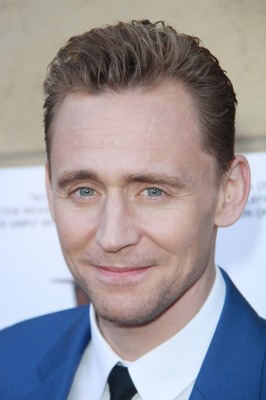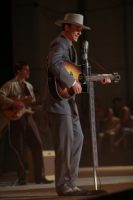By: Izumi Hasegawa March 29, 2016

Yes, I admit I crush on Loki from at first sight Tom Hiddleston played that character on the screen. Not Thor, nor Tony Stark nor Captain America. Then Loki became very popular in film adaptations of Marvel Universe. Tom did not expect that at all. Now he played iconic country star, Hank Williams who had fame while his short musician life. How Tom himself deals with fame? How he sees darkside of both chracters? (He answered with mimicking Anthony Hopkins!) And yes, we ask reader’s question!
 Q: What was the most challenging song for you to perform?
Q: What was the most challenging song for you to perform?
Ooh. The most challenging song was probably “Lovesick Blues”. “Lovesick Blues” is I think of all the songs Hank sang, he probably sang that the most, because it was a huge hit for him. He once went up on stage somewhere, it’s on an album called “The Lost Concerts” and he’s about to introduce it and he says, “I’m going to play a little song for you. I sang this 13 million and one half times. it’s earned us quite a few beans and biscuits.” It was obviously a real hit maker for him and he sang it with such control and such authority. He really must have done it in his sleep. I had to really accelerate that process. It’s a very technically difficult song. The yodel in it, you’re jumping octaves. So to be on pitch in every note in that song was really challenging and I had days where I felt like I was bashing my head against a brick wall, because Rodney Crowell and I would do take after take after take because if I was rhythmically precise, the pitch was off. If the pitch and the rhythm were right, Rodney would say, “Well you weren’t really feeling it. I lost your sincerity, I lost the twinkle, so can you put that back?” Then I’d have to twinkle and I’d go off rhythm again. That was probably the most challenging.
 Q: Let’s talk about dealing with fame, is it difficult? How does it affect your work, if at all?
Q: Let’s talk about dealing with fame, is it difficult? How does it affect your work, if at all?
Very difficult to talk about. Everyone has an opinion about fame, and it’s something that is not really about my opinion or my perspective. Everyone’s idea of it is different, so I have no control over it, really. The only thing I have control over is my work, and how I am perceived is beyond my control. I really am ok with that. If I expended energy worrying about it, about things I cannot control, people I’ve never met, in countries far away that maybe I will never see, if I worry about what they thought, my energy is better re-directed into the work, which is the most important thing. I’m very grateful that there are people who enjoyed my work and that’s the takeaway for me. If Loki garnered fans, than it’s a source of pride because it means they believed in the character and they enjoyed the character. The fact that he struck a chord with audiences is still a source of surprise and delight. I had no idea he was going to be such a popular character, and it continues to surprise me, to be honest. I’m just lucky enough to be able to keep doing the work and if there are people out there who want to watch it, then I’m happy.
 Q: Compared to acting in a Marvel film, do you find it refreshing at all to be in a film that’s based on a true story?
Q: Compared to acting in a Marvel film, do you find it refreshing at all to be in a film that’s based on a true story?
Are you saying The Avengers isn’t a true story? Honestly I think the interesting thing about this question is that I think for the audience the difference is greater than for actors. Our job, our obligation and our duty is to step into characters and play them truthfully, whether that’s a Norse god of mischief, or a North American icon, and so in terms of that commitment of empathy and psychological excavation, to me there is actually no difference. I’m flexing or exercising the same dramatic muscle. Of course it’s different in process. We were able to go, the three of us down to Shreveport and find real locations and inhabit those locations, without any sort of supplemented green screen or visual effects. So in that regard it’s different. The acting part of it, the extension of compassion and understanding, to me is the same.
On I Saw the Light if you wanted to have an opinion on the film, you were on the set. There’s nobody who had a creative influence on the film who wasn’t in Shreveport, in Louisiana, with us, on the day. It was the three of us and Dante Spinotti (DP) and the other actors, and if you wanted to have an opinion, you had to be there. With Marvel sometimes, because you’re part of this huge universe, sometimes there are people who have hugely important opinions on the day’s work who can’t be there in person so, decisions have to go through decision making processes of approval which is cancelling things down a bit.
 Q: So on that note, while you were getting in touch with your character, was there a particular moment you had that was memorable in helping you achieve that?
Q: So on that note, while you were getting in touch with your character, was there a particular moment you had that was memorable in helping you achieve that?
It was an amazing, defining moment for Marc (Abraham, director) and I. It was a beautiful day in Tennessee and we took a break from the singing and I went for this walk, as Marc says. “We were both trying to give ourselves a center, so through the shoot we would always be able to come back to the center and find out what we were trying to do.” It’s funny with these conversations. I found myself telling a story about Anthony Hopkins and something he had told me, which is when we were shooting the first Thor film, I was obviously playing the antagonist and he very sweetly invited me to his house for breakfast, and he said, [mimicking his best Hopkins’ voice] “I know what you’re doing. I’ve played a lot of antagonists. I’ve played a lot of parts in my life. I’ve played kings and princes and warriors and thieves. People stop me in the street, they ask me about one man. Who do you think that man is?” I knew who that man is and you know who that man is and I don’t have to say his name. It begins with an “H” and ends in “annibal Lecter.”
He said, “it’s interesting, because in my experience, people want their lives to be full of love and laughter and friendship and family. They want everyone to have nice lives and have happy lives, but when they listen to music, when they go to the theater, when they go to the cinema, they want somebody who’s brave enough to lean into the darkness. They want somebody who can express the darkness that they feel in their own lives, that they feel in their own hearts but they don’t want it at their front door. But that’s what they want. That’s what they want from art, they want from actors and musicians. They want people who can lean into the darkness.” I just thought it was the most powerful thing.
It’s a very strong memory, and it became a touchstone for us, because I realized that’s what Hank was doing, actually. That was the role he served. He could make people connected to the power of his songs because he wasn’t afraid to lean into that darkness. That’s what sometimes great art expresses on behalf of the audience.
I Saw the Light is playing in theatres nationwide.
